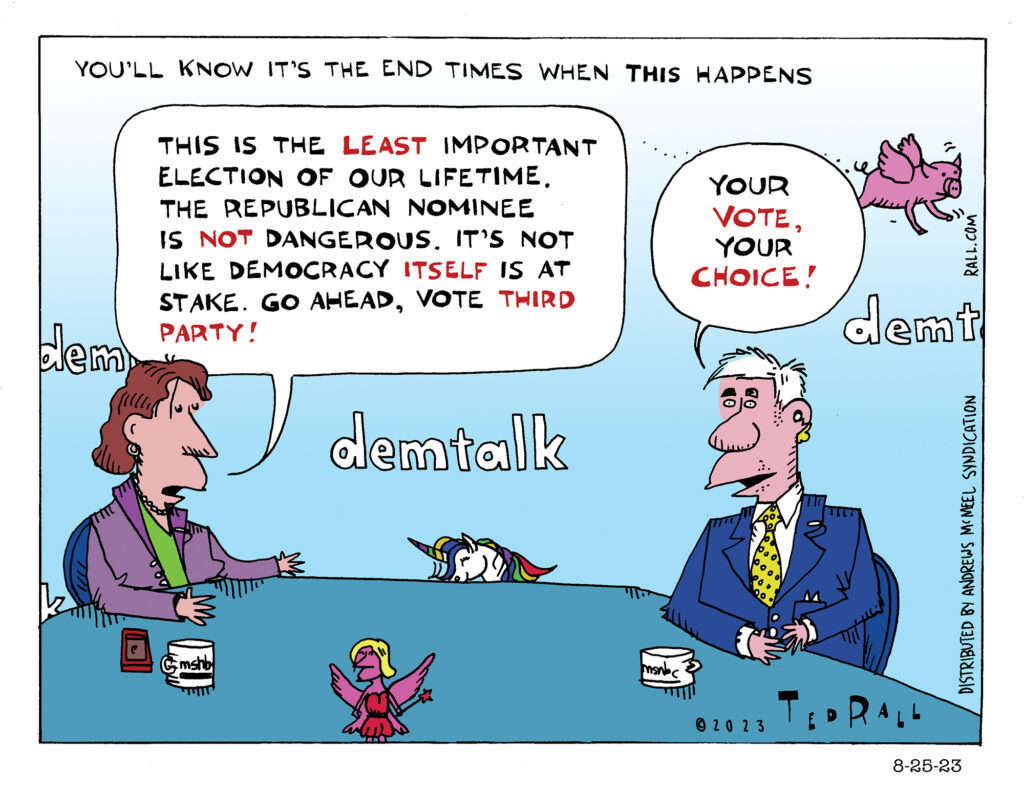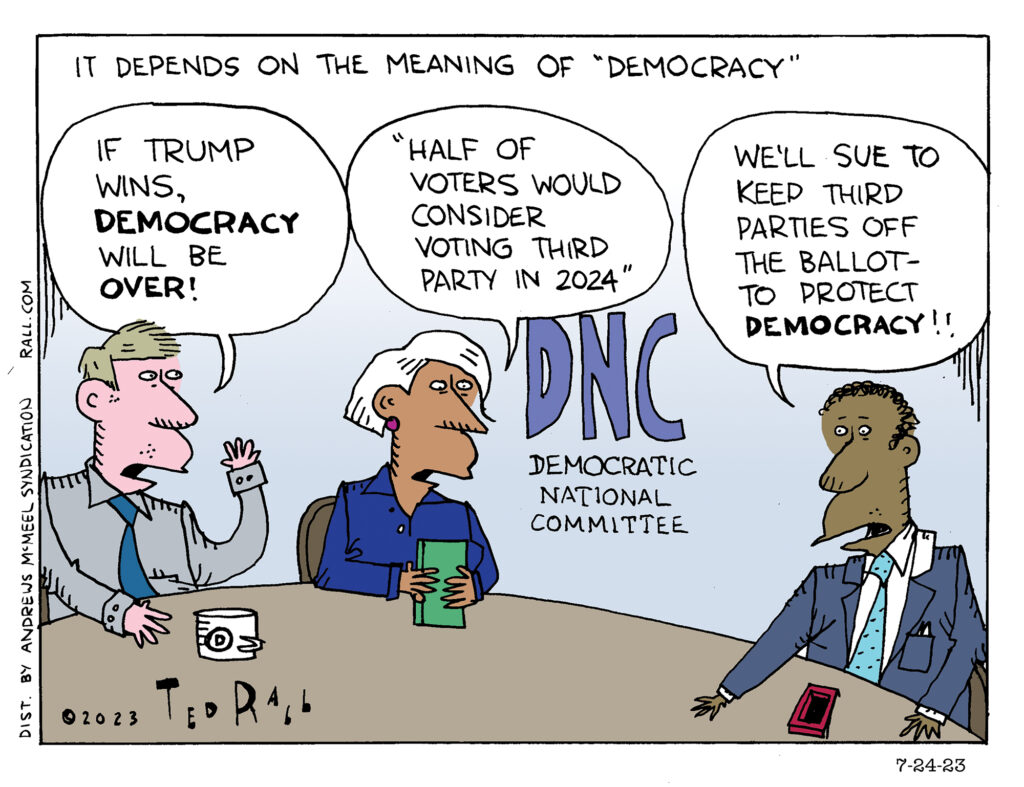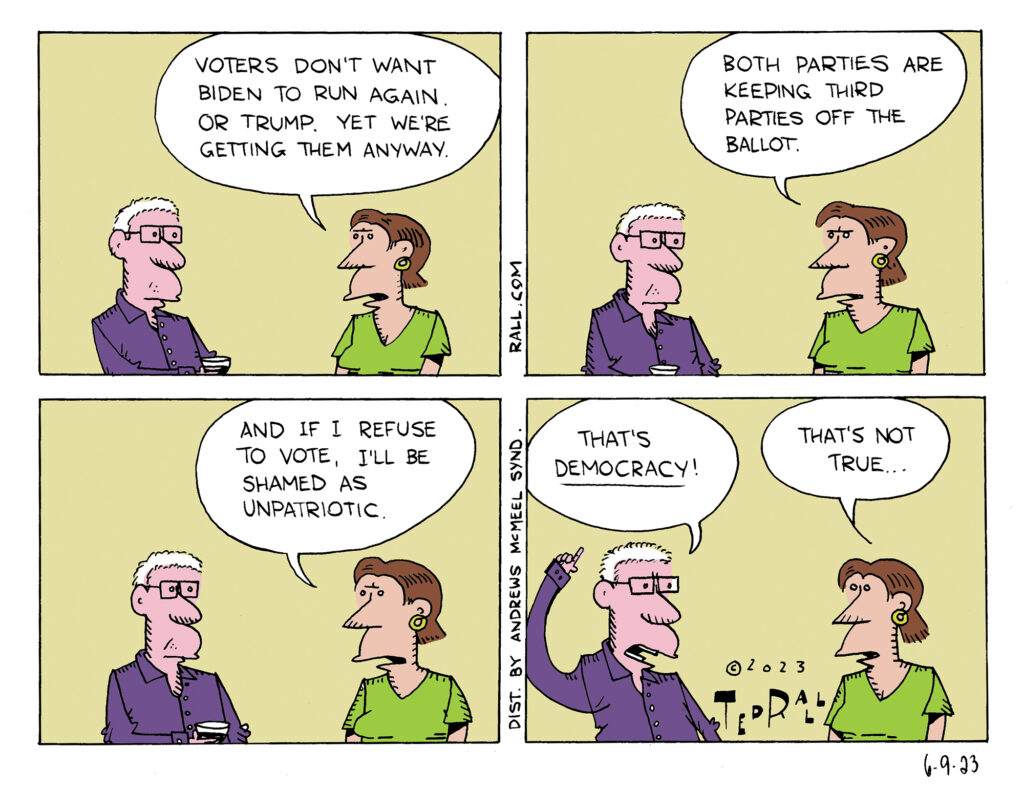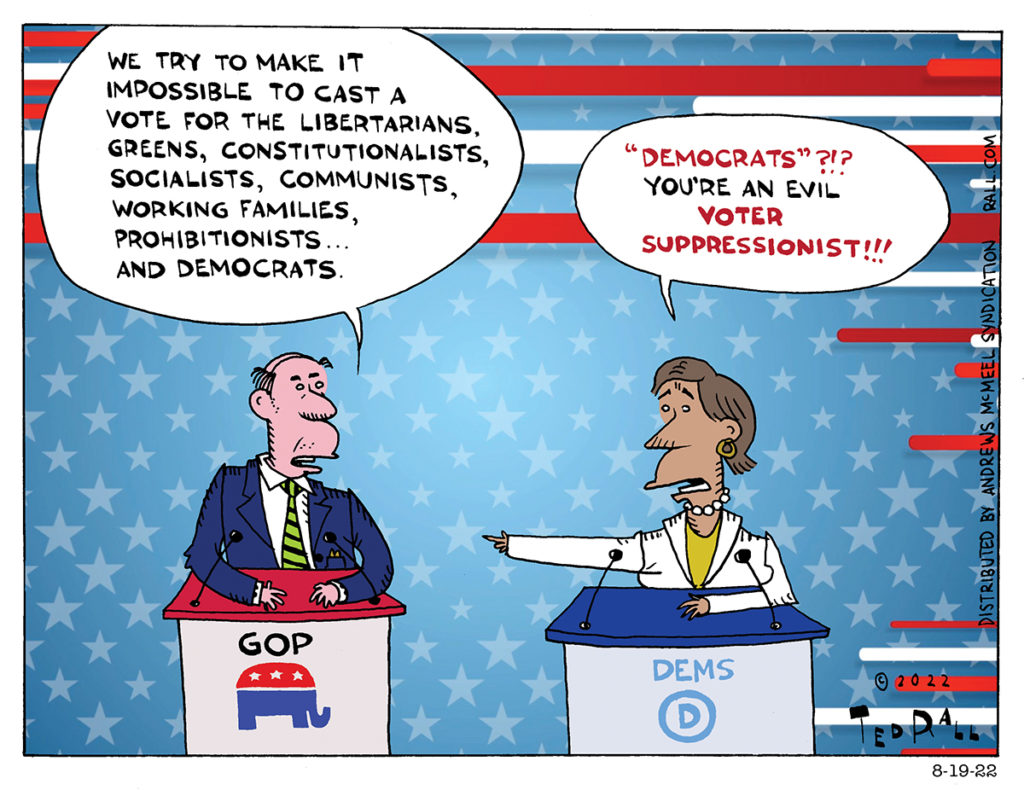Every single election, Democrats say the same exact thing: This is the most important election of our lifetime. Democracy itself is at stake. This is a vital time for us to come together and fight the Republicans because, this time unlike any other, they are dangerous and unreasonable. They would have more credibility were they to say, on occasion, that that wasn’t true.
Can You Vote for a Third Party? Take the Test.
The idea that third parties are spoilers is a baseless conspiracy theory on par with the Loch Ness monster, the man on the grassy knoll, and Pizzagate. But what if you’re worried, like many Democrats, that voting for a third party like the Greens’ Cornel West or, if they ever get their act together, someone from the No Labels Party, might improve Donald Trump’s chances of returning to the White House next year?
Given just how bizarre, manic and exhausting Trump’s four years were, I don’t blame you for being paranoid. It was a rough time for Democrats, more so than under previous Republican administrations. You’re traumatized. You’ll do just about anything to stop that from happening again!
(Those of us on the Actual Left, not Democrats, found Trump’s time in the White House more amusing than dispiriting. Sure, he mostly did stuff that we didn’t like. But so did Biden. Anyway, it’s not about us…not this week.)
Don’t worry.
We’ve got this.
You may very well be able to vote your actual conscience, assuming that you have one, and vote third party without increasing the odds of a Trump restoration by one iota. Take my hand and let’s find the answer to your burning question: can you safely vote third party?
First Filter: Do you live in a swing state?
In 48 states, the victor in the popular vote wins all that states’s electoral votes. Coupled with the fact that many states are lopsidedly either majority Republican or majority Democrat—by a lot—the electoral college’s winner-takes-all scheme ensures that votes for a small minority third party can only (theoretically) change the outcome in a “swing state” where the vote could go either way.
For example, the Democratic presidential nominee, whether it’s Joe Biden or RFK Jr. or a rutabaga, will win New York, where I live. New Yorkers like me, therefore, can happily vote for Dr. West or my cat or No Labels secure in the knowledge that they will not be doing anything to help Trump.
There will be four swing states in 2024: Georgia, Wisconsin, Arizona and Nevada. If you are one of the 92% of American voters who do not live one of these four swing states, your vote is 100% guaranteed to have no impact whatsoever on the election. Vote, don’t vote, vote red, vote blue, vote green, makes no difference—your state will fall into either the red or blue column. We already know which. Nothing can change the result.
Maine and Nebraska assign their electors proportionally. In one of these two low-population proportional-voting states, you could theoretically affect the assignment of a single electoral vote. However, the closest legitimate electoral-college margin was 23 votes, in 1916. (Bush beat Gore by 5 but that followed the Supreme Court’s awarding of Florida to Bush. The 1876 Tilden vs. Hayes race is officially listed as having been won by 1 elector, but was decided by Congress in an insanely racist corrupt deal and is universally considered to have been illegitimate.)
If you’re in the 8% of the population who live in Georgia, Wisconsin, Arizona and Nevada, please continue below.
If not, stop here. CONGRATULATIONS! You can vote third party!
Second Filter: OK, you’re a resident of Georgia, Wisconsin, Arizona or Nevada. What is the likely margin between the Republican and Democratic votes for president?
Note this number.
Third Filter: As a resident of Georgia, Wisconsin, Arizona or Nevada, how many votes do you personally control?
If you are a political power broker like Democratic Party boss James Clyburn of South Carolina (but not actually him since South Carolina is not a swing state), this number may be high—in the thousands, or even hundreds of thousands. Otherwise, because you can only control your one single vote when you go into the voting booth, this number is one. Note your number.
Fourth Filter: Subtract the answer in the Third Filter Question from the answer in the Second Filter Question.
If the answer is greater than zero, CONGRATULATIONS! You can vote third party!
If the answer is zero or less, STOP. You may not vote for a third party. As a Richard Daley-style political boss, or election machine hacker, or whatever scary person you are that allows you to control zillions of other people’s votes, it would be reckless and irresponsible for you to cast your many votes for a third party instead of Joe Biden, since your swing state might fall into the Trump column as a result.
(Ted Rall (Twitter: @tedrall), the political cartoonist, columnist and graphic novelist, co-hosts the left-vs-right DMZ America podcast with fellow cartoonist Scott Stantis. You can support Ted’s hard-hitting political cartoons and columns and see his work first by sponsoring his work on Patreon.)
Democrats and Republicans “Stole” Over 35,000,000 Votes From the Greens and Libertarians in 2020
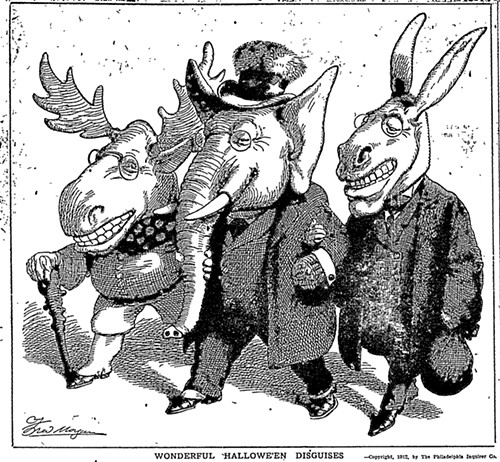
Many things that everyone knows, are not true. Sometimes, quite rarely, one of those widely-believed falsehoods not only turns out not to be true, but obscures the fact that the exact opposite is true.
Most people believe that small political parties siphon off votes from one of the two major parties. Mainstream media repeatedly declares, without bothering to cite evidence because their statement’s obviousness rises to the level of self-evident, that Ralph Nader cost Al Gore the 2000 election (not true) and Jill Stein sucked away enough Democratic votes from Hillary Clinton to put Donald Trump in the White House (also not true).
Let us, for the purpose of this essay, set aside the usual counterarguments to the claim that you shouldn’t vote Green because they’re just spoilers: no presidential election is decided by a single vote so you can’t possibly individually change the outcome, people who don’t live in swing states have no reason to worry about tipping an election, parties ought to have to earn votes, voting for a lesser evil is still voting for evil, a little party will never become bigger until we stop overthinking our tactical voting and simply support that candidate and the party we like best.
But—are small parties really electoral succubi? First, a look at Republican losers who blamed third parties for their losses.
Running as a Progressive in 1912, a vengeful Teddy Roosevelt out to punish his former protege for deviating from progressive Republicanism is alleged to have sucked away votes from William Howard Taft. We did wind up with President Woodrow Wilson, a Democrat—a result cited as the ultimate example of a third-party candidate splitting a party. But historians forget to mention that 1912 was a four-way race. Wilson faced his own “spoiler,” from his left: Eugene Debs of the Socialist Party, who got six percent of the popular vote. Taft was such a weak candidate that neither Teddy nor Debs made a difference; Wilson would have won no matter what.
Pundits say Ross Perot created a big enough sucking sound of votes from George H.W. Bush in 1992 to hand the race to Bill Clinton. Pundits are mistaken: Perot pulled equally from the Ds and the Rs. Libertarian Jo Jorgensen is unfairly blamed for contributing to Trump’s win in 2020.
Similarly, left-leaning third-parties—since 2000, this has meant the Greens—have never poached from Democrats in big enough numbers to change the outcome. Green Party supporters tend to be leftists like me, who would otherwise not vote at all. If the only two parties on the ballot were the Democrats and Republicans, we’d sit on our hands.
Greens can’t steal my vote from the Democrats. This is because Democrats didn’t have my vote in the first place.
The Greens are not a purer, more liberal version of the Democrats. Greens’ progressivism, which criticizes the economic class divide and prioritizes programs to reduce income and wealth inequality, and opposes militarism, is a different ideology than the Democrats’ corporate identity-politics liberalism of tokenism and forever wars. Democratic voters who care more about abortion, affirmative action and transgender rights than class issues are not likely to abandon them for the Greens, who are most interested in economic problems like the minimum wage and Medicare For All.
At the same time, progressives don’t think of the Democratic Party as a watered-version of Green progressivism. Progressives hardly see any difference between Democrats and Republicans. There’s little to no daylight between the Big Two on the matters progressives worry most about: economic unfairness and militarism.
The real spoilers are the two major parties who “steal” votes—from small parties like the Greens and the Libertarians. Unlike the little organizations, who count themselves lucky if they pull in three percent of the vote in a presidential race, Democrats and Republicans steal massive numbers of votes from their rivals.
I’m talking, of course, about the phenomenon of “strategic voting.”
“I’m a Democrat who loves Joe Biden but I’m voting for Howie Hawkins (or Cornel West),” said no one ever. On the other hand, a lot of people who would otherwise go Green instead vote Democratic because they are afraid of “wasting” their vote. Many “Democrats” are actually progressive, falling significantly to the left of the Democratic Party. If they thought the Greens could win, they would vote for them.
A 2019 Hill-HarrisX survey sums up the strategic-voting mentality: 65% of Democratic voters said they would prefer to vote for a primary candidate with the best chance to beat Trump than one who agreed with them on their top issue. What if Americans voted their opinions? What if “wasting your vote” wasn’t a consideration?
A 2021 Pew Research analysis found that six percent of voters belong to the “progressive left.” They tend to be young and highly-educated; they’re the “largest Democratic group to say it backed Sen. Bernie Sanders or Sen. Elizabeth Warren in the Democratic primaries (though members of this group broke heavily for Biden in the general election versus Trump).” An additional 10% are what Pew calls the “outsider left”: very young and “not thrilled with the Democratic or Republican parties—or the country writ large, for that matter.”
If the Green Party had full access to the political process, and we voted our opinions, it could expect to get all (or close to all) of the 16% of the vote who are progressives and alienated leftists. Full access to the system would include:
- Placement on ballots without having to overcome onerous ballot-access requirements and nuisance lawsuits by the Democratic Party
- Invitations to televised debates
- Media coverage at the same level of exposure as either of the two major parties
- Donations to finance advertising and data research at the same level as either of the two major parties
- No more attack pieces in the media characterizing third-party votes as “wasting your vote” for a “spoiler” who “can’t possibly win”
(I don’t have space to address other institutional advantages enjoyed by the Democrats over the Greens, like a big rich party’s ability to attract more high-quality candidates and the fact that Americans have been propagandized by their parents and teachers since childhood to believe that the two-party system is inherent to our political system.)
The Greens are so marginalized that it’s hard to imagine this alternative reality in which they were seen as a true “third party” on par with the Ds and the Rs—not kooks or weirdos, simply a third option. Even so, it’s safe to say they’d be closer to 16.0% of the vote than the 0.2% garnered by presidential nominee Howie Hawkins in 2020.
Pew also found that 12.0% of voters belong to what it calls the “ambivalent right”—irreligious, young, prefer smaller government and are “more moderate than other Republicans on immigration, abortion, same-sex marriage and marijuana legalization.” There’s a word for that orientation: libertarians. Yet, due to the same barriers faced by the Greens, the Libertarian Party only got 1.2% of the vote in 2020.
By my back-of-the-envelope calculus, Democrats and Republicans are poaching over a fourth of the overall vote—over 35 million—from the Greens and Libertarians.
(Ted Rall (Twitter: @tedrall), the political cartoonist, columnist and graphic novelist, co-hosts the left-vs-right DMZ America podcast with fellow cartoonist Scott Stantis. You can support Ted’s hard-hitting political cartoons and columns and see his work first by sponsoring his work on Patreon.)
DMZ America Podcast #100 | May 4, 2023: Making the Case for Third Party Candidates, Criminal Trials Are Endangered, on This, Our 100th Episode Scott and Ted Explain Why They Podcast
Gail Collins, columnist for the New York Times, writes that if you don’t like the choice of Biden or Trump TOUGH! Don’t you dare vote for a third party! American Editorial Cartoonists Ted Rall (from the Left) and Scott Stantis (from the Right) strongly disagree with her and make the case for voting and supporting third party candidates. Next, NPR and other news organizations are reporting that trial by jury is becoming less and less common. This is bad for you and bad for a justice system that gets worse and worse every year. Lastly, Ted and Scott celebrate their 100th episode of the DMZ America Podcast by discussing why they do it, and announce plans for future podcasts they know will interest you. You really should listen.
Watch the Video Version of the DMZ America Podcast:
DMZ America Podcast Ep 100 Sec 1: Making the Case for Third Party Candidates
DMZ America Podcast Ep 100 Sec 2: Criminal Trials Are Endangered
DMZ America Podcast Ep 100 Sec 3: Scott and Ted Explain Why They Podcast
The U.S. Is Not a Democracy
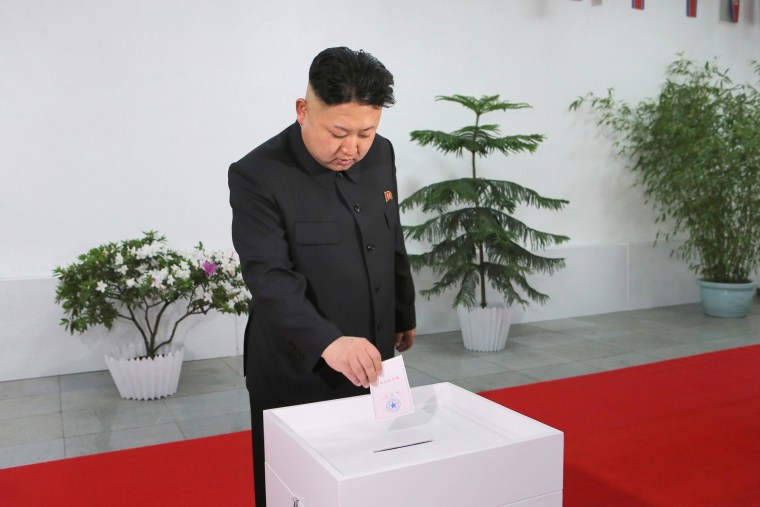
Is a system working as well as possible? Inertia lulls people into believing that legacy products are great—even that they’re perfect—without objectively considering whether it’s really true. The QWERTY computer keyboard works but the 1936 Dvorak version is superior. Skim milk makes you fatter. The U.S. may still be a shining city on a hill but our Constitution has become so out-of-date that new nations no longer refer to it as a template for their own legal charters.
Ask yourself: if our political system were created today, by a group of intelligent people, what would it look like? If the real-world system we see now falls short of that ideal, there’s room for improvement.
What if we were to scrap our centuries-old Constitution? What if we built a shiny new government from the ground up, without considering legacy or precedent?
This is a complicated question. Only one of out of four Americans would vote to repeal the Second Amendment, so the right to bear arms might make it into a new charter. Much of that support, however, derives from voters who own the hundreds of millions of guns already in circulation. An America without a legacy of individual firearms ownership would be much less likely to codify it as a fundamental right.
So what would an ideal representative democracy look like for the United States, 2023 edition?
Nothing like what we have now.
Every citizen of sufficient age to exercise sound judgement should be allowed to vote. Our society currently says 18. But there are strong arguments in favor of allowing children to vote as well as for raising the age of enfranchisement to 25. If mental acuity matters, what about the one out of ten Americans over age 65 who suffers from dementia, or those with very low IQ?
Among those permitted to cast ballots, each vote ought to count equally. The principle of one person, one vote is almost universally accepted.
Yet the current system falls dismally short of our professed ideal. Due to the electoral college, the vote of a resident of Wyoming in a presidential election counts 3.6 times more than that of someone who lives in California. People in the District of Columbia enjoy no vote at all; nor do the 4 million Americans who reside in overseas territories. Gerrymandering through redistricting has radically reduced the weight of a vote cast by a Black citizen compared to a white one. Forty-eight out of 50 states either ban convicted felons, people in prison and/or on parole from voting; the U.S. has some of the most vicious disenfranchisement laws in the world.
If a representative democracy is healthy and vibrant, voters ought to be able to choose from a broad selection of candidates who represent a wide range of ideological viewpoints that reflect the broad diversity of opinions in our vast country.
In this respect, the U.S. is not a democracy.
We only have two major parties. But not by choice. 62% of Americans say they want the option of a third party; dissatisfaction with the Democrats and the Republicans helps explain why the U.S. has one of the lowest voter-turnout numbers in the world. Smaller parties are barred from presidential debates, don’t receive coverage in the press, are stymied by draconian ballot-access laws drafted by Democrats and Republicans, and bludgeoned by nuisance lawsuits filed by the big two in order to drain their resources and block them the ballot.
In many elections, there aren’t even two parties. In 2016, 42% of races for seats in state legislatures were uncontested, meaning there was only one candidate on the ballot. There’s no word whether any of them was named “Saddam.” In 2022, a whopping 57% of state elections for judges were unopposed. I live in New York, where the Working Families Party provides an illusion of choice by appearing on the ballot next to the Democrats. But the WFP’s candidates are the same as the corporate Democrats.
Ranked-choice voting, promoted by progressives, sometimes leads to anti-democratic results. California’s small state Republican Party rarely has one of its candidates among the top two vote-getters who move past the first round to the general election.
Party primaries can be coronations, as when Barack Obama and Donald Trump essentially ran unopposed in 2012 and 2020, respectively.
Candidates are not legally bound to carry out their election promises if they win. Evolving circumstances or further reflection—or dishonesty—may prompt a politician to change course after victory. But there is accountability for perfidy, whether real or imagined, in a vibrant representative democracy. Rather than outsource politics to a political class every two or four years or whatever, citizens in a high-functioning representative democracy keep informed beyond the carnival of election season, express their opinions and hold their representatives’ feet to the fire with public protests and demonstrations, as we’re currently seeing in France after their imperious president ignored popular will by increasing the national retirement age without holding a parliamentary vote.
The U.S. does not have a high-functioning representative democracy. Voters are uninformed, don’t trust the media and can’t agree on the facts at the heart of stories and issues like whether climate change is real or Biden won the election.
Worst of all, we fail to hold our representatives accountable when they ignore us. Abortion is no longer legal in most states, 85% of American adults favor abortion rights, yet the streets remain calm and protester-free. Two out of three Democrats want big immediate action against climate change, yet they don’t have anything to say to President Biden—who probably blew up a major gas pipeline and created an ecological disaster, and authorized oil drilling in the ecologically fragile Alaskan wilderness.
If we were to create a new political system out of whole cloth, it wouldn’t look anything like this.
(Ted Rall (Twitter: @tedrall), the political cartoonist, columnist and graphic novelist, co-hosts the left-vs-right DMZ America podcast with fellow cartoonist Scott Stantis. You can support Ted’s hard-hitting political cartoons and columns and see his work first by sponsoring his work on Patreon.)
Voter Suppression? You’re Soaking in It
Democrats rightly criticize Republicans for efforts to suppress the Democratic vote. But both parties suppress third parties like the Greens and Libertarians. If you doubt that, look for the third parties next time you cast a ballot. Any country with just two parties can’t reasonably call itself a democracy.
Never Trump, Never Biden: the Progressive Case for Voting Third Party or Boycotting the Election
Republicans will vote for Trump no matter what. Democrats will vote for Biden no matter what. This column is for progressives weighing the pros and cons of succumbing to the two-party trap, and voting for Biden.
Unless you’ve been sucking through a ventilator in a COVID-19 ward for the last few months, you know the argument in favor of swallowing your disappointment that neither Bernie Sanders nor Elizabeth Warren are the Democratic nominee, resisting the temptation to punish the DNC for rigging the primaries, and forgetting Joe Biden’s right-wing voting record and Kamala Harris’ penchant for locking up innocent people of color and throwing away the key: Trump is a monster, his second term will bring fascism to America, Biden will be more amenable to pressure from the left than Trump.
Except for the part about Trump being a terrible human being, the call to sell out is all based on nonsense.
Reelecting Trump would send a nasty symbolic signal to the world but his actual presidency will almost certainly be characterized by the plagues of lame duckery. Second terms are worthless. Presidents don’t get anything done during their second term. Even FDR floundered. Whatever you think of Trump, does this president strike you as a brilliant Machiavellian tactician who has been holding back his most extreme instincts for four years? Smarter than Reagan, Clinton or Obama? Should Trump be reelected, he will almost certainly be impeached again. Allies like Mitch McConnell will drift away. He may face prosecution.
Some progressives are vulnerable to the argument that, though far from ideal, a neoliberal warmonger like Joe Biden nevertheless represents an improvement over Donald Trump. That argument fails.
Left-of-center electoral politics in the United States is not like football, a game in which a team moves the ball down the field in incremental steps. Mainstream corporate-owned Democratic Party politics is not on the same continuum as progressivism. Neoliberalism isn’t watered-down progressivism; progressivism isn’t a more robust form of neoliberalism. They are opposing ideologies. Progressives and centrists are enemies. When neoliberal centrists achieve power, progressives find themselves in the political wilderness. Obama didn’t have a single progressive in his cabinet. Biden doesn’t have any progressive top advisors.
Corporate Democrats ignore progressives. They crush them. Two major protest movements emerged under Obama, Occupy Wall Street and Black Lives Matter. Obama deployed the surveillance state to eradicate both. Ask Julian Assange and Edward Snowden how amenable corporate Democrats like Obama are to progressive demands for change. It would be idiocy to expect anything different from Biden, who just appointed an out-of-control former prosecutor during a period of unprecedented protest against police brutality.
Would Biden be better than Trump? Only in temperament. Qualitatively, Biden presents a friendlier face for a pro-business domestic agenda that features few substantial differences with the Republicans. Under his proposed Democratic administration, we can expect to see a continuation of a tax structure that favors wealthy individuals and corporations, shrinking union power and rising income inequality, a horrible for-profit healthcare system, and systemic police violence directed disproportionately against people of color and the poor.
Understandably, there is trepidation about the possibility of Donald Trump naming a successor to Supreme Court Justice Ruth Bader Ginsberg, who is ailing. Even if Democrats control the Senate after January, and Biden pushes through a liberal—which, given his record, is unlikely—the overall balance of the court will not change. It is a conservative court and it will remain one.
In foreign policy, there is far less cause for optimism. From Bosnia to Afghanistan to Iraq to Libya to Syria, Joe Biden has enthusiastically voted for and convinced his fellow legislators to support brutal foreign interventions. Though disgusting, Trump’s record is nevertheless far better than Biden’s. Trump has expanded Obama’s drone wars and supports the bloodthirsty Saudi regime in the proxy civil war in Yemen. Yet he also negotiated a deal for total U.S. withdrawal from Afghanistan and repeatedly expresses his willingness to negotiate with such adversaries as North Korea and Iran without pre-conditions.
Neither Trump nor Biden will do anything that progressives really care about. Neither will support the Green New Deal or, for that matter, doing anything real about climate change. Neither is in favor of student loan forgiveness. Neither will take the profit incentive out of healthcare.
Some progressives worry about “wasting their vote” on an outfit like the Green Party. What could be more of a waste than voting for someone who is against everything you care about?
In high school civics class they told you that a single vote can make a difference. They lied. Not in a national election. Not at the state level of a national election. In the closest battleground state of 2016, New Hampshire, Clinton beat Trump by 2,701 votes. Sure, if you and thousands of other folks vote the same way, outcomes can change. But you have no control over other people. You have one vote. That’s all. Even if you live in Ohio, you personally can’t change anything. So live free.
On the other hand, withholding your vote from the Democratic Party can have a positive impact. Several million primary voters cast ballots for Bernie Sanders in 2016 but stayed home in the general election. Primary voters are fanatics—only 12% turnout compared to about 55% in the general election—so when they don’t show up it’s a boycott, not apathy. After Hillary lost, party insiders concluded they would have to move left in order to motivate progressive base voters. Many contenders in the 2020 Democratic primaries espoused elements of Bernie Sanders’ platform. Without the 2016 progressive boycott, that never would have happened.
If you are trying to send a message with your vote, voting for a third party is likelier to register with analysts than staying home on election day.
Voting for Biden sends only one message: you approve of him and his politics. Why, after getting the milk for free, would he pay attention to any of the cow’s complaints?
(Ted Rall (Twitter: @tedrall), the political cartoonist, columnist and graphic novelist, is the author of the biography “Political Suicide: The Fight for the Soul of the Democratic Party.” You can support Ted’s hard-hitting political cartoons and columns and see his work first by sponsoring his work on Patreon.)

